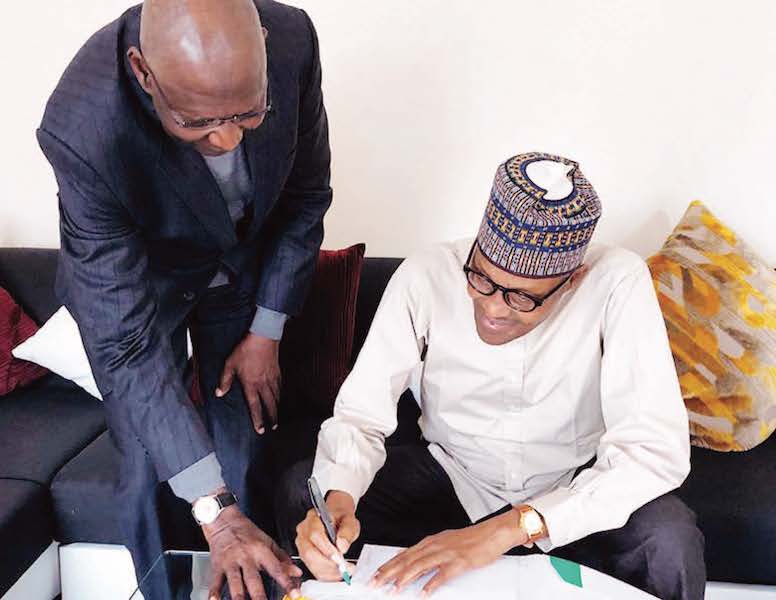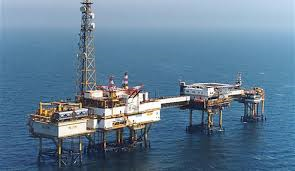Oil
Blames, counter blames as Buhari signs deep offshore oil bill into law

Yemie ADEOYE
LAGOS– THERE has been blames and counter blames coming on the heels of President Muhammadu Buhari’s assent to the deep offshore and inland basin bill.
The President has blamed politicians and oil companies for conspiring to deny Nigeria commensurate revenue from oil production and sales, particularly taxes over the years.
He said this on Monday after signing the amended Deep Offshore Act in London, as he noted that for many years, taxes were kept at the “barest minimum above $20 per barrel.”
The Senior Special Assistant to the President on Media and Publicity, Mr Garba Shehu, in a statement, quoted Buhari’s as saying at the event, “Today is an important day for all Nigerians, particularly the young generation.
“Today, I signed into law the amended Deep Offshore Act. Nigeria will now receive its fair, rightful and equitable share of income from our own natural resources for the first time since 2003.
“In that year, oil prices began a steep increase to double, and at times, triple over the following decade.”
But a cross section of oil industry experts and analysts who spoke to some of our correspondents on the condition anonymity stated that the blame can never be with the industry operators especially the international Oil companies. This is so according to them because it has always been the duty of government to set the regulating policies for every sector after due consideration n of every single variable that helps sustains that sector including its peculiarities.
They noted further that the series of uncertainties over the past decades which includes but aren’t limited to restiveness, multiple or higher taxations by different arms of government, and rent seeking by the same politicians that sets the rules as reason why it became difficult for any upward review of the deep offshore royalties and taxes in the past decades.
Specifically, the industry claims that a very charged work environment, coupled with policy inconsistencies both of which is governments responsibilities, would have been responsible for the lack of reviews on the part of past governments and never the fault of industry operators.
However the president insisted that all the while operation has continued over the years in the upstream sub-sector, Nigeria has failed to secure its equitable share of the proceeds of oil production, for all attempts to amend the law on the distribution of income failed.”
He noted that rapid reductions in the cost of exploration, extraction and maintenance of oil fields had occurred over the 25-year period.
“A combination of complicity by Nigerian politicians and foot dragging by oil companies has, for more than a quarter-century, conspired to keep taxes to the barest minimum above $20 per barrel, even as now the price is some three times the value.,” he said.
The President said for the first time, under the amended law, “200 million Nigerians will start to receive a fair return on the surfeit of resources of our land. Increased income will allow for new hospitals, schools, infrastructure and jobs.”
Oil
NNPC Targets 60% Methane Emission Reduction By 2031
The Nigerian National Petroleum Company Limited (NNPC) has unveiled a bold strategy to reduce methane emissions in the oil and gas sector by 60% by 2031, with an ultimate goal of achieving net-zero emissions by 2060.
This announcement reinforces Nigeria’s leadership role under the Global Methane Pledge initiative and its commitment to tackling climate change.
The Group Chief Executive Officer of NNPC, Mele Kyari, disclosed these plans during a meeting on Thursday with Robert Leahman, the U.S. State Department’s Global Methane Program Manager, and a delegation from Deloitte.
READ MORE: Atiku Gloats Over AUN’s Achievements Ahead Of 20th Anniversary
The discussions, held at the NNPC Towers in Abuja, focused on collaborative efforts to reduce methane emissions through innovative and sustainable practices.
“Reducing methane emissions is not just an environmental necessity but also a strategic imperative for Nigeria’s energy transition. We are leveraging partnerships to adopt global best practices and innovative solutions,” Kyari stated.
Key among these efforts is a pilot project in the Niger Delta, aimed at establishing emissions baselines, mitigating methane leaks, and promoting sustainable operations across Nigeria’s energy sector.
The project, a partnership between NNPC, Deloitte, and the U.S. Bureau of Energy Resources, will utilize data-driven methodologies to pinpoint and address methane hotspots.
Robert Leahman commended Nigeria’s proactive stance, describing it as a benchmark for other nations on the continent.
“Nigeria’s leadership under the Global Methane Pledge sets a standard for the continent. These initiatives will not only help reduce emissions but also drive sustainable development in the energy sector,” he said.
Kyari highlighted the broader benefits of addressing methane emissions, noting its significance for both environmental protection and economic efficiency.
“This collaboration is a game-changer. By addressing methane leaks, we’re reducing waste, saving costs, and protecting the environment. It’s a win-win for our economy and the planet,” he added.
Oil
FG Introduces New Incentives To Revitalize Nigeria’s Oil & Gas Industry
In a strategic move to revitalize Nigeria’s oil and gas sector, the Federal Government has unveiled two key fiscal incentives aimed at attracting investment and enhancing energy security.
The announcement was made by Mr. Wale Edun, the Minister of Finance and Coordinating Minister of the Economy on Wednesday.
The first initiative, the Value Added Tax (VAT) Modification Order 2024, introduces critical exemptions for essential energy products and infrastructure, including Diesel, Feed Gas, Liquefied Petroleum Gas (LPG), Compressed Natural Gas (CNG), Electric Vehicles, Liquefied Natural Gas (LNG) infrastructure, and Clean Cooking Equipment.
Read Also: Atiku Calls For Rotational Presidency Across Nigeria’s Geopolitical Zones
These exemptions are designed to reduce living costs for Nigerians, promote energy security, and accelerate the transition to cleaner energy alternatives.
The second initiative, the Notice of Tax Incentives for Deep Offshore Oil & Gas Production, offers new tax relief options for deep offshore exploration projects.
This measure aims to position Nigeria’s deep offshore basin as a premier destination for international oil and gas investments, boosting the country’s appeal to foreign investors.
These reforms are part of a broader set of policy initiatives, known as Policy Directives 40-42, endorsed by President Bola Ahmed Tinubu.
The directives reflect the administration’s commitment to fostering sustainable development in the energy sector and enhancing Nigeria’s competitive edge in the global oil and gas market.
Business
Tinubu set to approve ExxonMobil-Seplat oil deal, expands CNG bus initiative

By Yemie Adeoye
NIGERIA’s President Bola Tinubu has announced that the protracted ExxonMobil-Seplat upstream oil divestment will be formally approved by the Minister of petroleum within a matter of days, just as he announced his government’s intention to expand the Compress natural Gas, CNG buses initiative.
The President who stated this during his Independence day nationwide broadcast stated that the move is in line with his administration’s commitment to free enterprise, free entry and free exit in investments which is the hallmark of his administration investment policy.
“Fellow compatriots, our administration is committed to free enterprise, free entry, and free exit in investments while maintaining the sanctity and efficacy of our regulatory processes. This principle guides the divestment transactions in our upstream petroleum sector, where we are committed to changing the fortune positively. As such, the ExxonMobil Seplat divestment will receive ministerial approval in a matter of days, having been concluded by the regulator, NUPRC, in line with the Petroleum Industry Act, PIA. This was done in the same manner as other qualified divestments approved in the sector.”
The President also seized the opportunity to plead with Nigerians to be patient with his administration’s reform policies. “As your President, I assure you that we are committed to finding sustainable solutions to alleviate the suffering of our citizens. Once again, I plead for your patience as the reforms we are implementing show positive signs, and we are beginning to see light at the end of the tunnel”.
“Our energy transition programme is on course. We are expanding the adoption of the Presidential Initiative on Compressed Natural Gas for mass transit with private sector players. The Federal Government is ready to assist the thirty-six States and FCT in acquiring CNG buses for cheaper public transportation.
Fellow Nigerians, while we are working to stabilise the economy and secure the country, we also seek to foster national unity and build social harmony and cohesion. Our economy can only thrive when there is peace”. he enthused.














